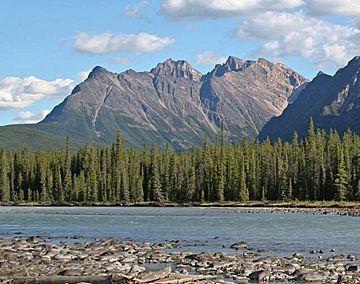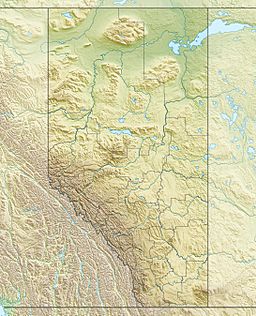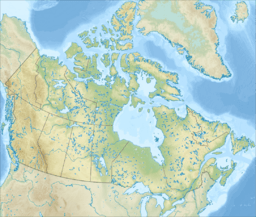Dragon Peak facts for kids
Quick facts for kids Dragon Peak |
|
|---|---|

Dragon Peak seen from Icefields Parkway
|
|
| Highest point | |
| Elevation | 2,880 m (9,450 ft) |
| Prominence | 246 m (807 ft) |
| Parent peak | Catacombs Mountain (3290 m) |
| Listing | Mountains of Alberta |
| Geography | |
| Location | Jasper National Park Alberta, Canada |
| Parent range | Canadian Rockies |
| Topo map | NTS 83C/05 |
| Type of rock | Sedimentary |
| Climbing | |
| First ascent | 1979 by D. Waterman |
| Easiest route | YDS Class 4-5 |
Dragon Peak is a cool mountain in Jasper National Park, Alberta, Canada. It stands about 2,880 meters (9,449 feet) tall. This peak is part of the amazing Canadian Rockies mountain range.
You can see Dragon Peak from the famous Icefields Parkway. It's located southeast of other mountains like Mount Christie and Brussels Peak.
The first time someone climbed to the top of Dragon Peak was in 1979. A climber named D. Waterman made this first successful ascent.
The mountain got its name in 1921 from Arthur O. Wheeler. He noticed a rock formation on the mountain that looked like a dragon! The name "Dragon Peak" became official in 1935.
What is Dragon Peak Made Of?
Dragon Peak is mostly made of sedimentary rock. This type of rock forms when layers of sand, mud, and tiny bits of ancient plants and animals settle over millions of years. These layers then get pressed together and harden.
The rocks in Dragon Peak were formed during very old time periods. These include the Precambrian and Jurassic periods. Later, huge forces pushed these rocks upwards. This created the tall mountain we see today.
Weather at Dragon Peak
The weather at Dragon Peak is part of a subarctic climate. This means it has long, very cold, and snowy winters. Summers are short and mild.
Temperatures can drop really low, sometimes below -20°C (-4°F). With the wind, it can feel even colder, below -30°C (-22°F). The snow and rain that fall on Dragon Peak eventually flow into Fryatt Creek and Luck Creek. Both of these creeks then join the big Athabasca River.
 | Isaac Myers |
 | D. Hamilton Jackson |
 | A. Philip Randolph |



